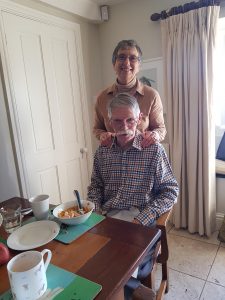
Classical music has always been part of the glue which binds our marriage. When we met I was 14 and he was 16. We became good friends for several years before we morphed into an “item”.
And music was key to all of that although we came at it from different angles. I was discovering Messiah, The Creation, Noye’s Fludde, Brahms’s Requiem, Schubert’s Unfinished and a lot more through singing and playing them at school. I also came from a home which rattled with music. My father was a semi-pro Ceilidh band leader and a lover of mainstream opera. And I’d heard it all like wallpaper for years.
The boy I’d recently met at a local youth club (who turned out to be from a family my father and uncle had known well before the war) was just a geeky teenager who’d turned his back on popular culture, thought he knew rather more than he did, and was busily building a vinyl library including the entire Ring Cycle conducted by Herbert von Karajan.
So we went to lots of concerts together, mostly at Royal Festival Hall (affordable for teenagers back then) and the Proms. We listened to music together too. He was very keen on several second hand record exchange places in central London. Eventually I started going to some of those with him. On one occasion we popped into a Soho shop where he knew the enthusiastic man quite well – or maybe not. Said man took one look at me, became very distant and I was told later, cooled from then on. The truth was, of course, that the shop owner was gay and thought MLO was too. I’d been taken there that day as a covert message. Hmm.
But I digress. The point I am making is that we’ve been sharing a love of music since 1961: concerts, CDs, radio programmes and lots more. For years he read The Gramophone regularly and rarely missed Saturday morning’s Building a Library on Radio 3 (to which all our radios have always been set). On our travels in the last 20 years or so we’ve also attended concerts in exciting overseas concert halls such as Sydney Opera House, Musikverein in Vienna, Berliner Philharmonie, Concertgebouw in Amsterdam and big halls in, for example, Chicago, Boston and Hobart.
It seems, alas, that all that is now over. Ms Alzheimer’s, who lives with us these days, is not keen on classical music. MLO is often restless. He often wanders aimlessly round the house fiddling with things in search of something to do. So, trying to settle him, I say something like: “Why don’t you go and sit in the sitting room and put some music on?”
He has forgotten how to switch it on so I generally go and set it up for him either via our new TV, which does all sorts of wonderful things, or sometimes I leave him with my iPad on which I have a fair amount of music downloaded. “What would you like?” I ask, usually trying to encourage him towards something very familiar such as a Beethoven symphony. So far so good but ten minutes later he’ll be drifting round the house again, clearly uncaptivated by the music. “What’s the matter?” I ask. “You used to spend hours listening to music? Why have you left that symphony?”
The chilling answer last week was a casual “Oh I don’t seem to be interested in anything like that any more”. WHAT?
You bloody swine, Ms A. Did you really have to take that from him (us) as well?
It’s a fairly recent development. Last summer, when I reviewed a number of proms I had only a single ticket for most of them, so MLO would listen to the live broadcast on the radio at home. I could ring him in the interval and say “How about that, then? Wasn’t it fabulous?” and he’d be able to have a sensible conversation with me about it. It’s going to be very different this summer.
Of course I still take him to concerts when I can and he sits there conventionally but doesn’t seem to engage with the music. He certainly can’t discuss it afterwards. I suppose I just have to be thankful that he enjoys it in his own way “in the moment” although how long will even that last?
This musical closing down comes and goes in and out of focus, like every other aspect of the cognitive decline which characterises this appalling illness. At the weekend I heard, by chance, on Radio 3 the Gulda cello concerto, which was new to me. I’ve moved MLO’s precious BOSE into the kitchen because he never now listens to it and it means that I can – and sometimes he’s there too. Now, that concerto includes some virtuoso cello work which is so sparky and flamboyant that it literally stopped me in my tracks. I caught MLO’s eye and, briefly, we shared the “wow!” moment as we always would have done. Be thankful for the occasional, small things, Susan.
Shakespeare has Portia refer, in completely different context, to “a swanlike end, fading in music.” Yes, that’s a good a summary as any.









